The decision to spay or neuter your pet rat depends on many factors. There’s not one right answer that fits all. Each individual rat’s health, behavior, age, and living circumstances help make the determination. For males, the choice to neuter is usually based on behavior. For females, spaying offers some wonderful health benefits often far outweighing the risks of surgery. Then, of course, choosing to have opposite sexes living together necessitates either neutering or spaying.
SPAYING YOUR FEMALE RAT
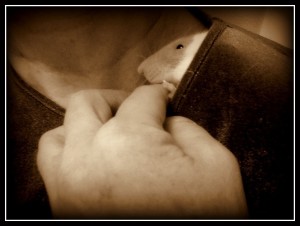
Advantages of Spaying
- Reduces occurrences of mammary and pituitary tumors
- Eliminates ovarian cancer and/or cysts
- Increases lifespan
These are all amazing benefits. I’ve had my last three female rats spayed and not one has developed a mammary tumor.
Spaying Makes Sense When…..
- You’d like to introduce a new young female rat to your current unneutered males.
- Your female rat needs mammary tumor removal surgery. This is an excellent time to spay to help prevent future mammary tumors from developing.
Note that spays are most effective for pituitary tumors when done between 3-6 months of age. Mammary tumors, however, can be prevented when spaying at any age.
When Not to Spay
- If your rat has respiratory disease, your veterinarian will assess whether or not the surgery is too risky. If the respiratory disease is mild, your rat will be placed on an antibiotic prior to surgery.
- If your female rat is in heat. Female rats usually go into heat every 4-5 days. Spay surgery performed two to three days post heat is ideal.
- If you’re unable to find a veterinarian who’s experienced and competent with rat spays
For me, the trickiest thing with pet rat spays is that there aren’t always veterinarians who are comfortable and experienced with performing this surgery. For many years I’ve wanted to have my females spayed and each veterinarian with whom I spoke was very tentative about the procedure. They’s say something such as “Well, I’ll give it a try”. Obviously, this is NOT what you want to hear from a veterinarian who’ll be performing surgery on your rat.

I finally found someone who’s performed almost 1,000 rat spays and is completely confident about her skills when performing this surgery. This particular veterinarian has gained much experience partly because she’s quite active in the local community performing pro bono rat spays for pet rat rescue organizations.
A brief note on the characteristics of a good surgeon: You want to find a veterinarian who’s forthright, one who right away says OF COURSE she can spay your rat. Often it’s the vets with the most brusque personalities who are the best surgeons. They’re quite confident and deft with their skills….and not always so great at “bedside manners”. However, when they’re performing surgery on your rat, it’s better to have a vet with moxy than one who’s wishy washy.
Terminology
SPAY: Includes the removal of the ovaries (regardless of whether or not all or part of the uterus is removed)
OVARIECTOMY: The ovaries are removed, the uterus is left intact.
OVARIOHYSTERECTOMY: The ovaries and all or part of the uterus are removed. (Most often the uterine horns are removed.)
NEUTERING YOUR MALE RAT
Although neutering doesn’t offer the significant health benefits that spaying does, there are a few behavioral circumstances in which you’ll want to have your male rats neutered such as when…..
- He’ll be living with a female AND you’re unable to have the female spayed (Note that a neutered male becomes infertile by three weeks post-surgery)
- He’s very aggressive and/or exhibits a lot of urine marking. (It can take up to 8 weeks post neuter to notice a decrease in aggression. Urine marking will either be reduced or eliminated.)
- He keeps trying to mate with your female even though she’s spayed and it’s too much for her to handle.
A side benefit of neutering is that “buck grease” is lessened. While this alone isn’t a reason to neuter a rat, the orange-ish oily secretions on a male’s skin (particularly on his back) are often decreased post neuter. This can, in turn, affect the scent of your male rat—he may no longer smell as musky.

Anecdotal Note: I rescued three male litter mates who’d been living together peacefully in their previous home. I adopted them when they were over a year old. One of the brothers became very aggressive, so I had him neutered. This helped them to all live together harmoniously until a second of the brothers became aggressive. After I had him neutered as well, all was peaceful again. Interestingly enough, the brother who was never neutered lived the longest.
The Neuter Procedure
An incision is made in the scrotal sac, the testicles are extracted and then excised. Although it’s a much less invasive procedure than a spay, this surgery is still elective and only needed for rats with behavioral issues. Scrotal abscesses can occur post surgery and are easily resolved.
Male rats can remain fertile up to three weeks post neuter. Aggression can take up to six to eight weeks to resolve.
Pre & Post Spay/Neuter Surgery
Pre-Surgery
If your rat has respiratory disease, surgery will usually be fine as long as the respiratory symptoms are mild. Your veterinarian will prescribe antibiotics which should be started at a minimum of several days before the surgery. If your rat is older, your vet may also place your rat on antibiotics prior to surgery to ward off infections that may occur due to a weakened immune system.
Fasting your rat prior to surgery is not necessary. Rats are physically unable to vomit. Dogs and cats must be fasted prior to surgery because their gag reflexes are suppressed while under anesthesia which can result in vomited food or gastric juices entering their lungs.
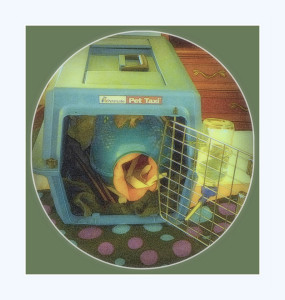
When bringing in your rat for the surgery, use a small carrier. An ideal size would be about 12″ X 24”. Line the enclosure with soft cloth such as cotton t-shirts. Using white or lighter colored cloth is helpful for monitoring blood stains.
Post-Surgery
Before bringing your rat home after his or her surgery, ask to take a look at the incision site with a technician or the doctor so you’ll know what “normal” is supposed to look like. (This avoids bringing your rat home and then wondering and worrying about whether or not s/he looks okay.)
Make sure you have contact information for an emergency vet who sees rats in case you need to contact them during the evening or weekend after your veterinarian’s office has closed.
In most cases surgical glue will be used so there won’t be sutures to monitor and then later return to the vet for removal. You’ll still want to check on the incision site several times a day to make sure there isn’t oozing, swelling or excessive redness.
Your veterinarian will prescribe a pain medication for you to give for the first few days after bringing your rat home. Usually metacam, buprenex or butorphanol is prescribed.
I like to sleep with my rat the evening after surgery. I realize this isn’t a possibility for everyone. If you’re not able to be in close quarters with your rat post surgery, you’ll want to
- Isolate them for the first night (at minimum)– set them up in a cozy carrier where they have fresh bedding, water and food.
- Cat carriers work well as a “recovery room” for your rats during the first 24 hours post surgery
- Again, use soft white or light-colored cloth for bedding (so you can easily monitor for any bleeding)
Liquids such as baby food can help make meals more appetizing especially the first night. Your rat may not be interested in eating, however, until the following morning.
Other than being sleepy, tired and not immediately interested in food, contact your veterinarian or an emergency veterinarian immediately if you observe any of the following:
- Bleeding
- Redness
- Swelling
- Oozing from incision site
- Re-opening of incision site
- Abnormal breathing
- Excessive lethargy – Your rat may be tired and sleepy but shouldn’t be completely limp and unresponsive

If you have any doubt at all about your rat’s recovery, call your veterinarian or (if after hours) an emergency vet.
Sometimes your rat may start chewing on non-food items such as cloth bedding. If your rat is doing this during her recovery period at home, make sure s/he’s not ingesting any of the non-food substances on which s/he’s chewing. You may need to remove what s/he’s been chewing and replace it with something she doesn’t want to chew. If this continues for more than 24 hours, call your veterinarian.
Your rat should return to normal eating, drinking, urinating and defecating by morning next day. If not, let your veterinarian know.
After 24 hours, female rats can visit with their cage mates under close supervision. She’ll need to be in an environment, though, where there’s no opportunity to climb, jump, run or use a wheel for the next 7-10 days. As long as she is healing well without complications, she can live with her friends in their normal environment 7-10 days post-surgery.
Males can be fertile for up to three weeks after being neutered. The hormonal effects causing aggression can take as long as 6-8 weeks post-neuter to subside.
Both males and females often gain weight after spay or neuter surgery.
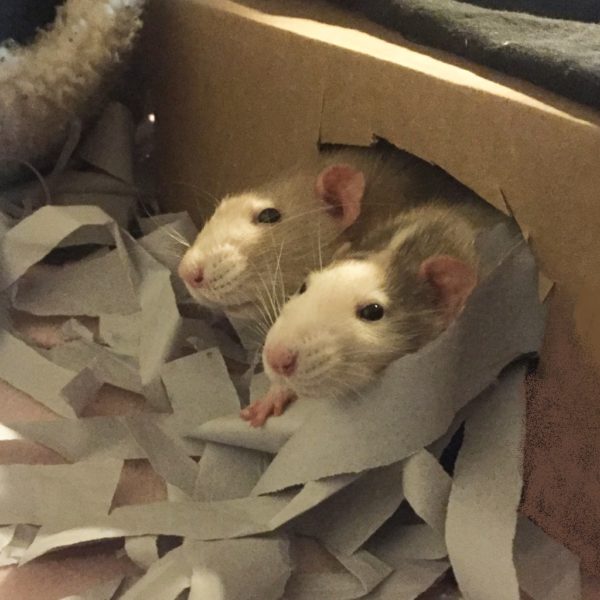
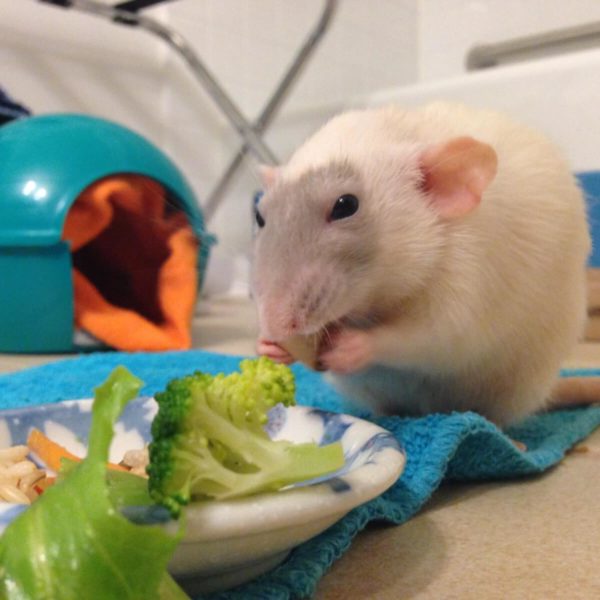
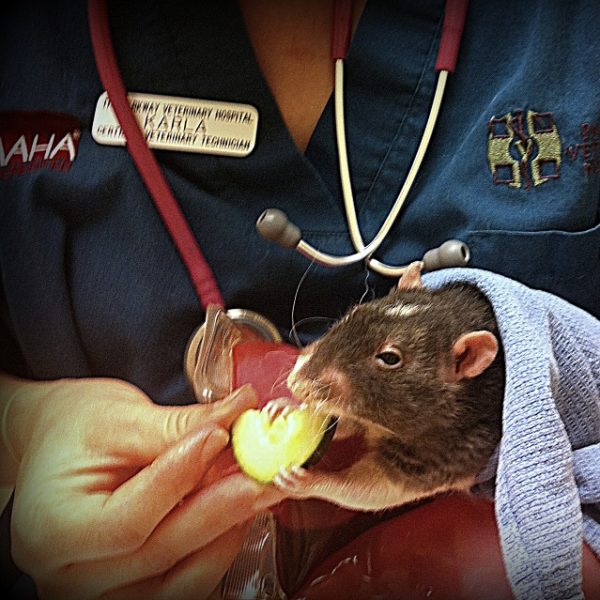
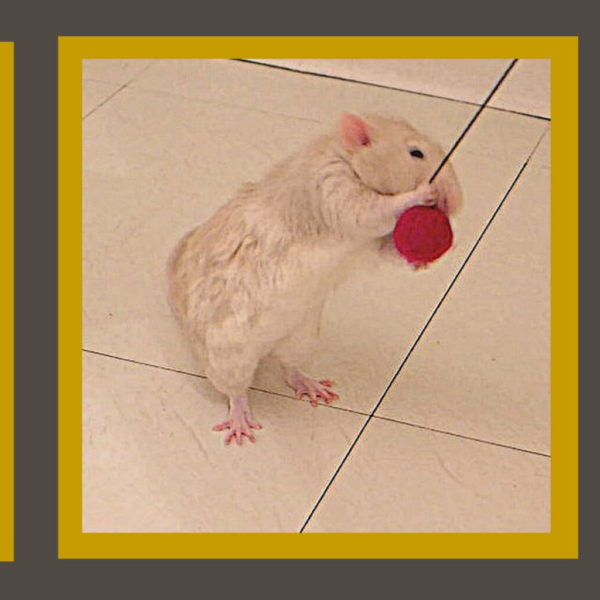



Just wanted to say thank you for such useful information. All very helpful and reassuring, knowing that you have long and successful experience of looking after bratlings.
Just got our first male after sadly losing one of two females and were considering neutering to allow them to cohabit. But we were unaware of the benefits of spaying. Though we are yet to find a vet who we really trust with rat healthcare it has made us reconsider what the best thing for our little girl rat is.
So thank you again for really helpful info.
Hi Jay,
I appreciate so much your letting me know my website has been helpful for you and your bratlings! (I love that you wrote “bratlings”—great name ;)
It makes me super happy to know there are people out there like you who are taking the time to learn about how to take the best care possible of their pet rats.
I think you’re going to love having a male and a female rat. It’s really fun and interesting observing their differences.
I hope you’ll be able to find a vet whom you’ll really be able to trust with your rats’ healthcare.
Thanks again for your wonderful comment.
Best Wishes to You & Your Rats,
Jasmine | About Pet Rats
Hi. I have had 4 of my boys neutered just yesterday, they are two seperate couples who did not get on before due to aggression and also due to stress levels going though the roof (puffing up by touching or trying to pick up). Today is the second day and they seem fine, sleeping alot, pooping and eating however I am unsure how long I should keep them seperate before trying to introduce again? I have read it might take up to 8 weeks, however I have also read people saying that they introduced rats to others within 2/3 weeks as long as they have healed okay and are not showing any signs of aggression, would this be correct? And how would I start the introductions as one pair have 3 boys (from whom 2 got neutered) and the other pair has 2, would a bath be okay? They can jump out of it.. Thank you so much.
Hi Kristiana,
I do like the idea of re-introducing them as soon as they are healed and are no longer showing any signs of aggression. I have had male rats become calmer post-neuter much sooner than 8 weeks. If you do notice any signs of aggression during the reintroduction process, stop the intros and wait a week or more before trying again.
I’m not a big fan of using a bathtub for introductions. The reason why I don’t like bathtubs is that they’re too enclosed. I like the rats being introduced to one another to have plenty of room to move away from one another. This makes them feel more in charge, more confident and more comfortable. Ideal areas for this can be on top of a bed or a table. You could also use a small bathroom as long as you make sure it’s set up safely.
A technique I’ve found to be most helpful is when you have a dish of liquid-type foods (such as yogurt or soup) that they have to lick from the plate. This gives them the option to be in close proximity with one another while enjoying yummy foods. They then associate the good vibes of getting a treat along with being close to one of the other rats. You can read more about this technique (and other introduction tips) here.
I hope these ideas are helpful for you and your rats. Don’t hesitate to let me know if you have any additional quesitons.
Best Wishes to You & Your Rats,
Jasmine | About Pet Rats
Thank you so much for the Rattys information so helpful I’ve had tame females B4 now have 2 kinda wild domestic Hooded and it’s challenging to clean, keep from fighting, exercise, etc their both sisters and 7 months hormonal 1 is alpha others not accepting it yet! Uugghhh! Anyways just a note to say your definitely appreciated! Seems to be rat 🐀 fights r common ? It’s a process 4 sure. Thanks again Lori Leigh Happy new Year’s! 2025.
Hi Lori,
Happy new year to you, too! Have you read my post Play, Tiff or Clash?: Understanding Pet Rat Relationships? I think you might find it helpful.
Recently I’ve found a new way to help my newer pet rats stop fighting with one another. When I see them start to fight, I intervene by distracting them with a toy or something else to do. It causes “pattern interrupt” and they forget all about wanting to fight. It’s especially helpful if you redirect them several times in a row while they’re outside the cage during free range time. Just thought I’d mention this in case it’s helpful.
Best Wishes to You & Your Girls,
Jasmine | About Pet Rats
Thanks for your expressing your appreciation for my website!
I need to have my male fancy rats neutered yesterday. They are becoming aggressive and I do not want to give them up. Is there any where that could help? I’m on disability and have two minor children. So I’m really stuck.
Hi Elizabeth,
You can have one rat neutered at a time which would save money. This is especially helpful if one of your rats is more aggressive than the other. You will need to keep them housed separately while the neutered rat is healing from surgery as well as until the hormones have subsided. As stated above, it can take up to 8 weeks for the hormones to become diminished. Sometimes, however, you’ll get results more quickly.
It’s hard to tell, but I’m guessing your concern is about the expense of neutering. Keep in mind that rats need ongoing medical care throughout their lives. It’s even a good idea for them to have wellness checkups. Unfortunately, rats are not inexpensive pets to keep. If you are concerned about money, it could be best to find them a home with someone who has the income with which to support them.
I’m sorry to hear you’re in such a difficult situation. I really feel for you. I do understand it’s not easy to make these types of decisions.
Please let me know if you have any other questions.
Sending good wishes to you, your rats and your children,
Jasmine | About Pet Rats
What’s the youngest age you can desex a male?
Hi Mabel,
Male rats can be neutered as young as 8-10 weeks. Some veterinarians, however, prefer to wait until a male rat is 6 months old. I highly recommend your taking any new rat in for a checkup within 1-2 weeks of adopting them. During this time you can discuss with your vet when they think the best age would be to have your male rat neutered. You’ll need to have your rat examined prior to surgery anyways. You may be able to accomplish both your rat’s first check-up as well as the pre-op vet visit—depending on how young your rat is when adopted and at what age your vet recommends neutering.
I hope my response is helpful. Let me know if you have any other questions any time.
Take Care,
Jasmine | About Pet Rats
Hey, I want to get my rat neutered but he’s almost two now. Do you think that’s too old? He just had a surgery to remove a spot on his back and that procedure went fine, but I still don’t know whether I should. My boyfriend has female rats. My rat is the only male so I’m housing him alone so we don’t end up with babies. I know he’d do better in a more social environment which is why I’ve been debating.
Hi Kylie,
Thanks for asking your great question. The first thing I would do is to ask your vet (who just recently performed the surgery) what they think about neutering your rat. If your veterinarian is experienced with and knowledgeable about pet rats, they would be the best person to ask whether or not neutering at this age would be too risky—or not.
From my personal experience, I’ve had many 2 year old males whom I believe would have done fine with having a neuter surgery at that age. In addition, I’ve actually had a couple of males whom I did have neutered at that age—-after checking with their vet, of course, to make sure it was safe for each of them.
Another point to consider: Would your boyfriend consider spaying his females? As noted in the above article, spaying females has so many benefits. If you do have a vet in your area who can spay rats, I highly recommend getting the females spayed and then you wouldn’t have to be concerned about getting your male rat neutered.
So, these are all some ideas to consider. I hope my responses are helpful. Feel free to ask further questions if you need any clarification or need additional information.
Best Wishes to You, Your Boyfriend and All of Your Rats,
Jasmine | About Pet Rats
I had my rat neutered but he still seems to want to mate with my other female rat. It’s been around a month since I got him neutered so I’m not really worried about him getting my other rat pregnant, I just wanted to know if he’ll eventually stop being in heat.
Hi Aubrey,
After being neutered, any aggression can take up to six to eight weeks to resolve. As far as “mounting” behavior goes, this is something that may not go away. Sometimes it’s a behavior that’s become ingrained in a rat and they just continue to do it instinctively.
If your female rat appears to be distressed by your male rat’s mounting behavior—especially if he’s doing it excessively—you can gently separate them when you see it occurring. It is a natural thing to have happen, though, and most females are able to take care of themselves.
I hope this information is helpful. Also, you probably already read above about how beneficial it is to spay female rats. I know not everyone is fortunate enough to have a vet in their area that spays rats but, if you do, I highly recommend it. Just so you know, though, even when a female rat is spayed a male is still likely to want to “mount” her.
Best Wishes to You & Your Rats,
Jasmine | About Pet Rats
PS: I tried to email you to let you know I answered your question and to give you the link to my response. However, the email address you supplied came back as being “unavailable”.